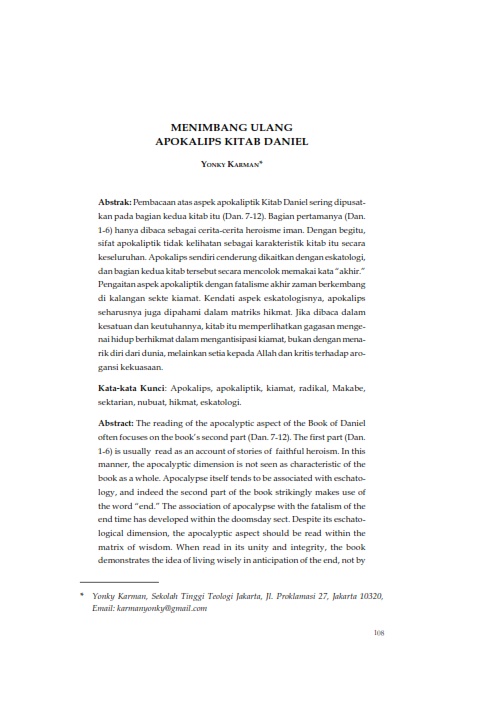Menimbang Ulang Apokalips Kitab Daniel
Abstract
Abstrak: Pembacaan atas aspek apokaliptik Kitab Daniel sering dipusatkan pada bagian kedua kitab itu (Dan. 7-12). Bagian pertamanya (Dan. 1-6) hanya dibaca sebagai cerita-cerita heroisme iman. Dengan begitu, sifat apokaliptik tidak kelihatan sebagai karakteristik kitab itu secara keseluruhan. Apokaliptik sendiri cenderung dikaitkan dengan eskatologi, dan bagian kedua kitab tersebut secara mencolok memakai kata “akhir.” Pengaitan aspek apokaliptik dengan fatalisme akhir zaman berkembang di kalangan sekte kiamat. Kendati aspek eskatologisnya, apokaliptik seharusnya juga dipahami dalam matriks hikmat. Jika dibaca dalam kesatuan dan keutuhannya, kitab itu memperlihatkan gagasan mengenai hidup berhikmat dalam mengantisipasi kiamat, bukan dengan menarik diri dari dunia, melainkan setia kepada Allah dan kritis terhadap arogansi kekuasaan.
Kata-kata Kunci: apokaliptik, kiamat, radikal, Makabe, sektarian, nubuat, hikmat, eskatologi.
Abstract: The reading of the apocalyptic aspect of the Book of Daniel is often focused on the book’s second part (Dan. 7-12). Its first part (Dan. 1-6) is read only as stories of faithful heroism. In this manner, the apocalyptic dimension is not seen as characteristic of the book as a whole. Apocalypse itself tends to be associated with eschatology, and indeed the second part of the book strikingly makes use of the word “end.” The association of apocalypse with the fatalism of the end time develops within the doomsday sect. Despite its eschatological dimension, the apocalyptic aspect should be read within the matrix of wisdom. When being read in its unity and integrity, the book demonstrates the idea of living wisely in the anticipation of the end, not by withdrawing oneself away from the world, but by being faithful to God and being critical of the arrogance of power.
Keywords: apocalyptic, doomsday, radical, Maccabees, sectarian, prophecy, wisdom, eschatology.

DISKURSUS applies the Creative Commons license (CC BY). We allow readers to read, download, copy, distribute, print, search, or link to the full texts of its articles and allow readers to use them for any other lawful purpose. The author must be aware that the article copyrights will be fully transferred to DISKURSUS if the article is accepted to be published in the journal. Once the manuscript has been published, authors are allowed to use their published article under DISKURSUS copyrights. Full information about CC BY can be found here: https://creativecommons.org/licenses/by/4.0/












